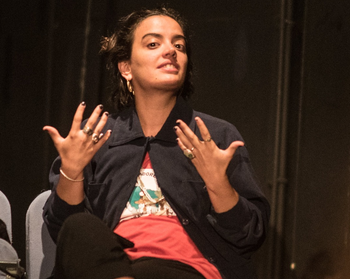Raisa Inocêncio Ferreira Lima (Federal University of Rio de Janeiro)
Early Career Fellow in Research Area 3: "Future Perfect"
May–October 2024
Ancestrofuturism: A Short Entry on the Cosmogonic Odyssey Around Afro-Diasporic and Afro-Brazilian Storytelling
This research project delves into the Orixas from the Nago/Yoruba cosmogony, which have fascinated scholars due to their Afro-Diasporic roots. Despite the shadows of colonisation and enslavement, they have preserved narratives, aesthetic representations, religious practices and culinary traditions, integral to Brazil's cultural heritage. Embracing the diverse cosmogonies, the project seeks to craft an ancestrofuturistic cosmogony, coupled with orally recounted myths.
The research spotlights the revival of myths, exploring their multifaceted symbolic significance. It delves into word circulation shaping Afro-Brazilian divine myths and popular expressions, aiming to combat gender, racial and class violence while detoxifying colonial legacies. This endeavour revitalises dialogues on intersectional violence traumas, fostering meaningful connections and repairing relationships scarred by colonisation.
Methodologically, the project integrates critical pedagogy and draws inspiration from transformative literary figures like Maryse Condé and Conceição Evaristo. Through oral retellings and analyses of cultural myths and rituals, particularly from the Yoruba/Nagô pantheon, it examines concepts like Axé (vital force) and Orí (destiny / individuality). This exploration aims to resist inherited violence and promote cultural performances. The introduction will delve into the etymology and philosophy of Candomblé and Umbanda cults, exploring central notions like Axé and cosmogonies of key Orishas. It embraces concepts of ancestry and lived experience, aiming to translate theoretical knowledge into practical forms. Aligned with the theme of "future perfect," the project seeks to preserve historically persecuted African and Afro-Diasporic cultural legacies. By reclaiming the past, it aspires to inspire egalitarian futures. In sum, this project aims to create a concise survey on African and Afro-Diasporic cosmogonic philology and philosophy, spotlighting selected oral myths of the Orishas and recognising African orality’s pervasive cultural influence. This research contributes to new cultural studies, psychological aesthetics and colonial history, fostering new epistemologies and preserving cultural heritage at its roots.
Raisa Inocencio, a Brazilian scholar, earned her PhD in philosophy from the University of Toulouse (France) with her thesis: "Tell me Venus, why do they hunt women?" Throughout 2023, she actively participated in seminars held at Gaston Berger University (Senegal), Universidad San Martin (Argentina), the I Virtual Symposium of Decolonial Praxis (Riverside University, California) and the 40th anniversary mini-meeting of the Brazilian postgraduate researcher's association ANPOF (Fortaleza, Brazil). In 2022, she co-authored, alongside Karina Bidaseca, the book Lélia Gonzalez: For an Amefrican Feminism. Furthermore, she works as a translator (Ana Mendieta, A Bird from the Ocean, Nau Publisher, 2021). In addition to her academic pursuits, Raisa engages as an artist and activist, focusing on providing support to fight the enduring effects and assist in the healing of colonial wounds. As part of her activism, she organises solidarity events to raise funds for the Pataxó health project in Bahia, which receives co-financing from the Occitanie region in France. Actively involved in research communities, she contributes to groups such as Maria Carolina de Jesus (UFRJ, Brazil), Lélia Gonzalez Network (Brasilia University, Brazil) and Epistemologias del Sur (CLACSO, Argentina).
